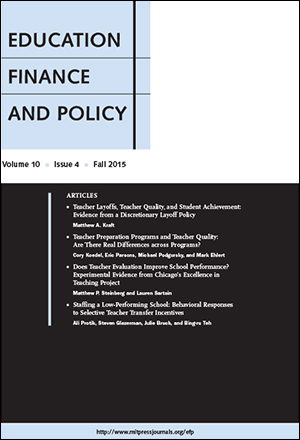1. What effect did the pilot teacher evaluation system have on school level performance in mathematics and reading?
2. Did the pilot teacher evaluation system differentially impact schools with different characteristics (for example, did the pilot program have a greater impact on lower or higher achieving schools)?
3. Did the effect of the pilot, if any, persist over time?
Chicago Public Schools initiated the Excellence in Teaching Project, a teacher evaluation program designed to increase student learning by improving classroom instruction through structured principal–teacher dialogue.
The pilot began in forty-four elementary schools in 2008–09 (cohort 1) and scaled up to include an additional forty-eight elementary schools in 2009–10 (cohort 2). Leveraging the experimental design of the rollout, cohort 1 schools performed better in reading and math than cohort 2 schools at the end of the first year, though the math effects are not statistically significant. We find the initial improvement for cohort 1 schools remains even after cohort 2 schools adopted the program. Moreover, the pilot differentially impacted schools with different characteristics. Higher-achieving and lower-poverty schools were the primary beneficiaries, suggesting the intervention was most successful in more advantaged schools. These findings are relevant for policy makers and school leaders who are implementing evaluation systems that incorporate classroom observations.


